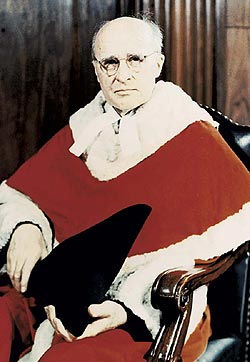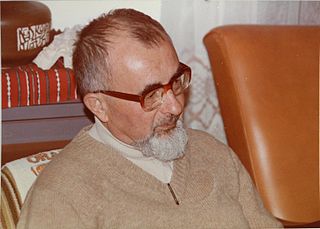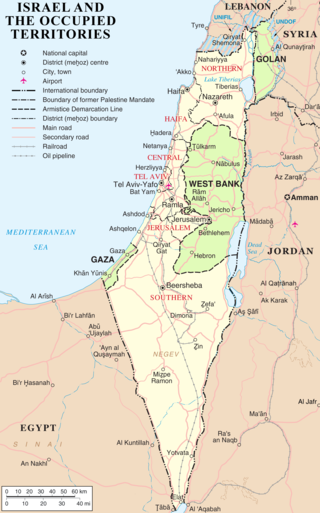Related Research Articles

Messianic Judaism is a modernist and syncretic movement of Protestant Christianity that incorporates some elements of Judaism and other Jewish traditions into the Christian movement of evangelicalism.

Elyakim Rubinstein is a former Vice President of the Supreme Court of Israel. Beforehand, he served as the Attorney General of Israel from 1997 to 2004. Rubinstein, a former Israeli diplomat and long-time civil servant, has had an influential role in that country's internal and external affairs, most notably in helping to shape its peace treaties with Egypt and Jordan.
The Law of Return is an Israeli law, passed on 5 July 1950, which gives Jews, people with one or more Jewish grandparent, and their spouses the right to relocate to Israel and acquire Israeli citizenship. Section 1 of the Law of Return declares that "every Jew has the right to come to this country as an oleh [immigrant]". In the Law of Return, the State of Israel gave effect to the Zionist movement's "credo" which called for the establishment of Israel as a Jewish state. In 1970, the right of entry and settlement was extended to people with at least one Jewish grandparent and a person who is married to a Jew, whether or not they are considered Jewish under Orthodox interpretations of Jewish law.

Conversion to Judaism is the process by which non-Jews adopt the Jewish religion and become members of the Jewish ethnoreligious community. It thus resembles both conversion to other religions and naturalization. The procedure and requirements for conversion depend on the sponsoring denomination. Furthermore, a conversion done in accordance with one Jewish denomination is not a guarantee of recognition by another denomination. Normally, though not always, the conversions performed by more stringent denominations are recognized by less stringent ones, but not the other way around. A formal conversion is also sometimes undertaken by individuals whose Jewish ancestry is questioned or uncertain, even if they were raised Jewish, but may not actually be considered Jews according to traditional Jewish law.
"Who is a Jew?" is a basic question about Jewish identity and considerations of Jewish self-identification. The question pertains to ideas about Jewish personhood, which have cultural, ethnic, religious, political, genealogical, and personal dimensions. Orthodox Judaism and Conservative Judaism follow Jewish law (Halakha), deeming people to be Jewish if their mothers are Jewish or if they underwent a halakhic conversion. Reform Judaism and Reconstructionist Judaism accept both matrilineal and patrilineal descent as well as conversion. Karaite Judaism predominantly follows patrilineal descent as well as conversion.

Ivan Cleveland Rand was a Canadian lawyer, politician, academic, and justice of the Supreme Court of Canada. He has been described as "probably the greatest judge in Canada's history".

Falash Mura is the name given to descendants of the Beta Israel community in Ethiopia who converted to Christianity, primarily as a consequence of Western proselytization during the late 19th and early 20th centuries. This term also includes Beta Israel who did not adhere to any Ethiopian Jewish practices, as well as the aforementioned historical converts to Christianity. While most voluntarily converted, some were also forcibly converted against their will, or felt compelled to convert due to economic hardship and social exclusion in a majority Christian population.

Shlomo Moshe Amar is the former Sephardic Chief Rabbi of Israel. He served in the position of Rishon LeZion from 2003 to 2013; his Ashkenazi counterpart during his tenure was Yona Metzger. In 2014 he became the Sephardic Chief Rabbi of Jerusalem.

Oswald Rufeisen (1922–1998), religious name Daniel Maria, was a Polish-born Jew who survived the Nazi invasion of his homeland, in the course of which he converted to Christianity, becoming a Catholic and a friar of the Discalced Carmelites. He sought Israeli citizenship under the Israeli Law of Return, but was refused. However, he moved to Israel as a Carmelite friar, where he spent the rest of his life, and acquired citizenship through naturalization.

Israel has occupied the Palestinian territories and the Golan Heights since the Six-Day War of 1967. It previously occupied the Sinai Peninsula and southern Lebanon as well. Prior to Israel's victory in the Six-Day War, occupation of the Palestinian territories was split between Egypt and Jordan, with the former having occupied the Gaza Strip and the latter having annexed the West Bank; the Sinai Peninsula and the Golan Heights were under the sovereignty of Egypt and Syria, respectively. The first conjoined usage of the terms "occupied" and "territories" with regard to Israel was in United Nations Security Council Resolution 242, which was drafted in the aftermath of the Six-Day War and called for: "the establishment of a just and lasting peace in the Middle East" to be achieved by "the application of both the following principles: ... Withdrawal of Israeli armed forces from territories occupied in the recent conflict ... Termination of all claims or states of belligerency and respect for and acknowledgment of the sovereignty, territorial integrity and political independence of every State in the area and their right to live in peace within secure and recognized boundaries free from threats or acts of force."
The status of territories captured by Israel is the status of the Gaza Strip, the West Bank, the Golan Heights, and the Sinai Peninsula, all of which were captured by Israel during the 1967 Six-Day War.
The Tal Committee was an Israeli public committee appointed on 22 August 1999 which dealt with the special exemption from mandatory military service in the Israel Defense Forces (IDF) given to Israeli ultra-Orthodox Jews which had been the status quo from the time of Ben Gurion, as well as extending mandatory military service to Israeli-Arabs. The committee was appointed by Prime Minister Ehud Barak and was initially headed by former Supreme Court Justice Tzvi Tal. The committee was later headed by Yohanan Plesner before its official dissolution on 2 July 2012, two days before submitting its report, hence the term Plesner Committee.

The Chief Rabbinate of Israel is recognized by law as the supreme rabbinic authority for Judaism in Israel. The Chief Rabbinate Council assists the two Chief Rabbis, who alternate in its presidency. It has legal and administrative authority to organize religious arrangements for Israel's Jews. It also responds to halakhic questions submitted by Jewish public bodies in the Diaspora. The Council sets, guides, and supervises agencies within its authority.

Israeli citizenship law details the conditions by which a person holds citizenship of Israel. The two primary pieces of legislation governing these requirements are the 1950 Law of Return and 1952 Citizenship Law.

Homesh was an Israeli settlement in the West Bank along Route 60, just south of the Palestinian towns of Silat ad-Dhahr and Fandaqumiya, illegally built over private Palestinian land. The settlement was under the administrative jurisdiction of the Shomron Regional Council. In 2005, the settlement homes were demolished along with three other settlements in the northern West Bank, at the same time as the Israeli disengagement from Gaza.

In Israel, marriage can be performed only under the auspices of the religious community to which couples belong, and inter-faith marriages performed within the country are not legally recognized. However, marriages performed abroad or remotely from Israel must be registered by the government. Matrimonial law is based on the millet or confessional community system which had been employed in the Ottoman Empire, including what is now Israel, was not modified during the British Mandate of the region, and remains in force in the State of Israel.
Israeli Jews or Jewish Israelis are Israeli citizens and nationals who are Jewish through either their Jewish ethnicity and/or their adherence to religious Judaism. The term also includes the descendants of Jewish Israelis who have emigrated and settled outside of the State of Israel, where they are predominantly found in the Western world. The overwhelming majority of Israeli Jews speak Hebrew, a Semitic language, as their native tongue.
Basic Law: Israel as the Nation-State of the Jewish People, informally known as the Nation-State Bill or the Nationality Bill, is an Israeli Basic Law that specifies the country's significance to the Jewish people. It was passed by the Knesset—with 62 in favour, 55 against, and two abstentions—on 19 July 2018 and is largely symbolic and declarative in nature. The law outlines a number of roles and responsibilities by which Israel is bound in order to fulfill the purpose of serving as the Jews' nation-state. However, it was met with sharp backlash internationally and has been characterized as racist and undemocratic by some critics. After it was passed, several groups in the Jewish diaspora expressed concern that it was actively violating Israel's self-defined legal status as a "Jewish and democratic state" in exchange for adopting an exclusively Jewish identity. The European Union stated that the Nation-State Bill had complicated the Israeli–Palestinian peace process, while the Arab League, the Palestine Liberation Organization, the Organization of Islamic Cooperation, and the Muslim World League condemned it as a manifestation of apartheid.
ITIM is an Israeli not-for-profit organization founded in 2002 by Rabbi Seth Farber to improve the way the State of Israel regulates and administers matters of Jewish identity and Jewish life. ITIM addresses government policies that govern personal status in legal matters such as registering marriages and the right to enter Israel under the Law of Return that are determined in part by an individual's legal status as Christian, Muslim or Jewish.
Hinduism and Judaism are among the oldest existing religions in the world. The two share some similarities and interactions throughout both the ancient and modern worlds.
References
- ↑ Landau, Asher Felix (1971-01-01). Selected Judgments of the Supreme Court of Israel. Transaction Publishers. ISBN 978-1-4128-3386-8.
- ↑ Maor, Nicole (April 2022). ""Who is a Convert?" – The Law of Return and the Legality of Reform and Conservative Conversions in Israel" . Israel Studies. 27 (2): 24–40. doi:10.2979/israelstudies.27.2.04. ISSN 1527-201X.